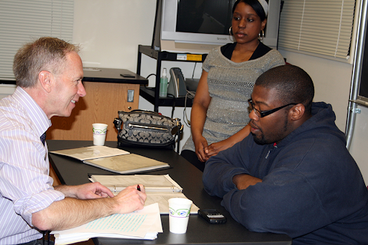
Family Social Science, in the College of Education and Human Development, works to enhance the wellbeing of diverse families in a changing world through teaching, research, and outreach. The department's 19-member faculty offers a Family Social Science B. S. to a student population that typically numbers 275–300 students. Students in this major are challenged to write both for research-oriented audiences and lay audiences and are often working in community outreach and client services.
Writing in Family Social Science
Scholarship in Family Social Science seeks to understand and find effective solutions to the problems families face. The faculty members consider undergraduate learners a universal resource and writing as a method of development and implementation of those learners’ skills and thinking talents. The kinds of writing undergraduates complete over the course of their degree include emails, letters, journal entries, structured writing assignments, digital stories, presentations, contracts, abstracts, reflection papers, and themed/research papers. Primarily, faculty members believe that good writing is good thinking, the two advancing each other in a dynamic manner. Writing in the field is characterized by its...
- Clarity: writing that is mutually understood by the writer and reader
- Accuracy: writing that demonstrates coherent reasoning and uses sources accurately, and
- Evidence: writing that contains facts, precedence, and accumulated knowledge
Writing Abilities Expected of Family Social Science Majors/Menu of Grading Criteria Used in Family Social Sciences Courses
Members of the faculty identified the following menu of criteria from which colleagues can select and adapt items relevant to course-specific writing assignments:
The text...
- Evidences ideas using credible and persuasive information sources (i.e. self-reflection and/or information derived from external sources).
- Evaluates information and/or experiences using critical and analytical lenses. (This criterion applies to both research and reflective papers.)
- Synthesizes multiple perspectives, such that a new perspective emerges.
- Uses systems perspective in analyzing, developing, and/or framing subject matter.
- Consistently addresses target audience(s).
- Writes consistently and appropriately within confines of genre and medium (i.e. paper, poster, presentation, etc.).
- Avoids language that would diminish people and/or ideas.
- Documents sources using APA citation format.
- Organizes document as stipulated by APA.
- Uses a register and style appropriate for the target audience.
- Uses cohesive paragraphing; both individual paragraphs and sequences of paragraphs hang together.
- Organizes logically; readers know where they are going and why they are going there.
Highlights from the Writing Plan
In implementing its Writing Plans, the Family Social Science department has devoted significant time to refining its criteria and mapping its curricula to ensure that students have multiple opportunities to practice and polish their approaches to discipline-relevant writing projects. With RA help, they've also developed a faculty-facing website devoted to instructional resources. The site features a small collection of five-minute workshop models as well as strategies for working effectively with multilingual student writers. The department has been refining students' capstone experience, which emphasizes critical reflection and self-assessment in the context of a senior-level internship. Students present these projects in a public Student Showcase event each spring.
